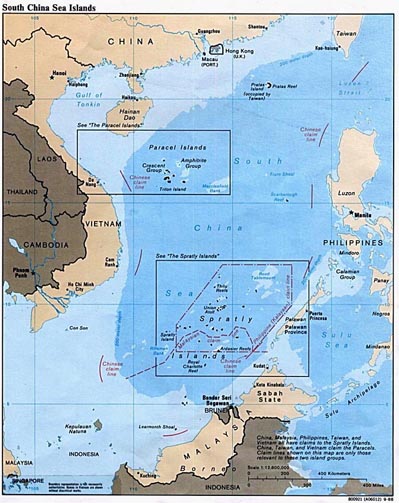 Taiwan
Communiqué No. 85, March 1999
Taiwan
Communiqué No. 85, March 1999 Taiwan
Communiqué No. 85, March 1999
Taiwan
Communiqué No. 85, March 1999In the discussions surrounding the status of Taiwan, one of the most-often-heard canards from the side of the Chinese and their supporters is that Taiwan was part of China "since historical times." For those who have started to believe this deception, we have some wise words from some of the historic Chinese leaders themselves:
|
"Taiwan has never been a part of China." Manchu Emperor Yung-Cheng in 1684 |
|
"...we advocate the independence of the Taiwanese nationality." Dr. Sun Yat-Sen in 1925 |
|
"...we must restore the independence and freedom of the brethren in Korea and Taiwan..." Generalissimo Chiang Kai-Shek in 1938 |
|
"...we will extend (Korea) our enthusiastic help in their struggle for independence. The same thing applies to Formosa (Taiwan)." Mao Tse-Tung in 1938 ( quoted in Edgar Snow's book "Red Star Over China", page 110 in the Grove Press, NY edition of 1961) |
These pronouncements were published in July 1992 by the Washington-based Formosan Association for Public Affairs (FAPA). The statements were based on the scholarly research of Frank S.T. Hsiao and Lawrence R. Sullivan, as published in "Chinese Communist Party and the Status of Taiwan, 1928-1943," Pacific Affairs, 52(3), Fall 1979, pp. 446-467.
Another important lesson from history was provided by our reader Jonathan Lin, who wrote the following:
|
The Kuomintang's national airline, China Airlines, has become the subject of many jokes in Taiwan. First and foremost, because of its anachronistic name: it should adopt a more appropriate name, such as Air Taiwan, or Taiwan International Airlines.
Second, because it is still managed primarily by a number of old Kuomintang airforce generals, who don't have a clue how to run a modern airline. We thought we 'ld share the following story, submitted by our reader Columbus Leo:
|
A China Airlines plane makes a routine approach to an airport. The plane descends, descends, and finally the wheels touch the runway. However, the plane immediately bounces, and then slides into the grass field. The pilots frantically brake hard and try to keep the plane straight. The plane nearly tips over several times hitting a few more bumps and skids left, right, left, etc. Finally the plane comes to a full stop in the mud. The passengers scream, bump their heads, and some passed out. Fortunately no one was seriously hurt. The stewardesses begin to prepare for emergency exits through the many exit doors. The pilot says to the co-pilot "Holy mackerel, that runway was short"!! The co-pilot goes "yeh, that runway sure was short", and then — after looking out of his side-window — adds "Hey, but why did they make it so wide?" |
During the past months, the tension in the Spratly Archipel has gradually increased. The major reason is the fact that China is building up its military fortifications, especially on the aptly-named Mischief Reef, only 150 miles from the Philippine island of Palawan. The absurdity of China's claim is illustrated by the fact that this island is more than 1,000 miles from the Chinese mainland, and some 700 miles south of Hainan Island.

The island group is located strategically near the main shipping lanes from East Asia around the Malacca peninsula. Five nations, The Philippines, Malaysia, Vietnam, Taiwan, and China lay claim to a number of islands in the archipelago. In 1988, Vietnam and China fought a major battle over Fiery Cross Reef, but the most recent tension is due to the Chinese encroachment on islands claimed by the Philippines, which started with the building of "temporary structures" in 1995.
Starting in October 1998, the Chinese began to "upgrade" the structures, and according to recent press reports, these have now been completed. The Chinese obviously intend to present the Philippines and other nations in the area with a fait accompli and -- if there is no strong pressure from the US and other nations -- will further increase their military presence in the area.
The Philippines has protested the moves, and even detained a number of Chinese fishermen in the area, but it lacks the military power to deter China. In the meantime, the United States have either ignored or downplayed the issue, wanting to avoid yet another friction point with China. During a recent visit to Washington, former Philippine President Fidel Ramos expressed his deep concern about the fact that the Clinton Administration was ignoring the issue, and urged the United States to offer more than vague commitments to freedom of navigation.
China's moves appear to be part of a wider campaign to maneuver itself into a position to have the capability to strangle shipping from East Asia through the Malacca Strait. The US publication Defense News highlighted this issue in a recent cover story ("Chinese Moves Roil Region", February 8th 1999).
According to a recent presentation in Washington by Mr. David G. Wiencek of the International Security Group, the shipments along the sealanes flanking the Spratly's account for some US$568 billion, or 15 percent of all global cross-border trade, and some 75 percent of Japan's oil is shipped through these sealanes.
It is thus not just a matter of a local border conflict, but freedom of navigation and trade will become a major issue if China is left undeterred.
Back to: Table of Contents
Copyright © 1999 Taiwan Communiqué